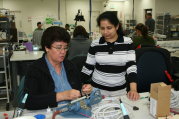Occupational outlook. Are employers hiring for jobs in this area?
Yes! As you will see from the newspaper help-wanted sections and online job boards, hiring is quite active in electronic technology. Companies that hire graduates of the electronics program include: Baxter, Parker Hannifin, Toshiba, Alcon Labs, Conexant, Q Logic, Western Digital, Wonderware, Broadcom, Agilent, Allergan, and Medtronic. Electrician trainees may be hired by large commercial contractors such as Hackney Electric and smaller local electrical contractors.
Technology background. Can I pursue a career in this field without a background in technology?
Yes, definitely! You do not need a background in technology to enter Electronic Technology or to train as an electrician. It does help to have basic computer skills, especially for Electronic Technology. Math skills, up to algebra and some trigonometry are also helpful, but you can brush up on your math skills when you enroll in the program if necessary.
Accessibility for women. Isnít electronic technology a tough field for women to break into?
More and more women are building successful careers in electronic technology and as electricians. There is nothing about these occupations that excludes women from participation. Irvine Valley College has made a special effort to recruit and retain women to meet the growing demands of the field. We have a Reentry and Womenís Center right on campus to help you with your transition into college. You can also explore this website for success stories of women in the field, e-mentoring, and other opportunities to network with women in technology fields.
Receptivity to hiring women. Will employers hire women into male-dominated technology areas?
Absolutely! We know of many employers who have hired women as electronics technicians and electricians. Although women may have not been well represented in these fields in the past, this is changing. A wide range of industries employ electronics technicians, including telecommunications (telephone and cable TV), biomedical, computer, automotive, aerospace, and the government. Electricians are hired by large commercial contractors and facilities as well as by small local electrical contractors. Visit E-Jobs to locate companies specifically looking to hire women.
Jobs available. What kinds of jobs can I get with a certificate and with an A.S. degree?
The certificate and A.S. degree in Electronic Technology qualifies graduates for work as an electronic technician, including roles as a test technician, in-house repair (bench) technician, field service technician, computer technician, customer/field support technician, biomedical instrument technician, or research and development technician, among others.
Students who enroll in the IVC Electrician Certification Training program (and register that enrollment with the state Department of Apprenticeship Standards) qualify for legal employment as electrician trainees. For this occupation, certification is offered by the state rather than by the college. Thus, under current state law, continued enrollment in the program is vital to finding a position as an electrician trainee.
Salaries. What kind of salary can I expect?
Salaries vary considerably depending on the industry and size of the employer. The average wage at placement is $15 per hour. New graduates can expect $17 to $26 per hour, depending on the industry they work in. The mean salary for Electrical and Electronic Engineering Technicians in Orange County is $51,962.
More information. Where can I learn more about technology careers and what they're like for women?
We have several women enrolled in the Electronic Technology program with whom you could talk about the program. Youíll also find a great deal of information on this website about women in technology careers. For starters, you can find a female mentor at e-mentoring, join our e-mail list for women students at Irvine Valley College, talk online with women in the field at Women Tech Talk, network with other women at a Women in Technology International meeting, and read our Success Stories about other women in this and related fields.
Our Career and Job Placement Center on campus can also provide more information, or visit E-Jobs to find employers ready to hire women in this field.
Math skills. How much math do I really need?
For the Electronic Technology program, it helps to have Algebra I and some basic Trigonometry. For the Electrician program, youíll need to know basic arithmetic and how to use formulas and a calculator. If youíd like to brush up on your math, you can enroll in Mathematics 351 (Arithmetic Review and Pre-Algebra Mathematics). Read more about this course in the math section of the course catalog.
You may also be able to use software from the CalWomenTech Learning Library that helps you develop spatial reasoning skills (the ability to see things in three dimensions), boost your math and problem solving skills, and more.
Technology skills. How can I prepare for the program if I don't have a background in technology?
You donít need a background in technology to succeed in these programs. However, it does help to have basic computer skills and math (up to algebra and trigonometry) when you begin the Electronic Technology program. Studies show that improving spatial relationships can help women increase their academic achievement. If you donít have a background in technology, you may want to visit the CalWomenTech Learning Library at Irvine Valley College and check out resources such as software that helps you understand spatial relationships.
Keep in mind that once youíre in the program, youíll have plenty of chances to try out your new technology skills. All of our courses include hands-on laboratory instruction, and CWE 168, our Cooperative Work Experience course provides opportunities for supervised job experience.
Placement Tests. Are placement tests required for this program?
There is no placement test for the Electronic Technology program.
Courses required. How can I find out what courses I need to take for the Electronic Technology and the Electrician Certification Training program?
To find out what courses youíll take in the electronic technology program, consult the course catalog. To learn more about the Electrician Certification Training program, visit the programís website.
Length of program. How long will it take to complete this technology program?
To obtain an A.S. degree will take between 2 to 3 years. To complete a certificate of achievement will take between 1 and 1-1/2 years. The length of time to complete the program depends on whether or not you are also working and how many classes you take each semester.
For the Electrician Certification Training Program, you must enroll in at least 75 hours of classes each semester in order to legally work as a trainee, until you become eligible to take the state certification exam (after two to four years of employment).
High school preparation. Can I prepare myself for a technology program at IVC while Iím still in high school?
Yes you can! The best way to prepare yourself for a career in Electronic Technology is to study math courses through algebra, and preferably including trigonometry. Physics and chemistry are also recommended. Developing comfort and skill on a computer will also help.
Weight-lifting requirements. How can I prepare myself physically to meet the weight-lifting requirements for a job as an Electronic Technician?
No significant weight-lifting is required for electronic technicians. To prepare yourself physically to work as an electrician, maintain normal muscular strength and mobility through regular, moderate exercise.
Child care. What services does the college provide for students who need child care assistance while at school or work?
The center offers priority placement to students, who receive a 20% discount if they are enrolled in at least six units and meet income requirements. Additional financial aid to assist students with child care may be available through programs such as CalWorks, the Department of Rehabilitation, Extended Opportunity Programs & Services (EOPS), and the Childrenís Home Society. Be sure to inquire about all these programs if you need financial help with child care.
The program is accredited by the National Association for the Education of Young Children, and takes pride in its varied curriculum, which offers choices to meet the learning needs of each individual child. The center provides a high quality child care environment for children so their parent(s) will have the space and time to attend classes, do homework, work, and succeed in meeting their school and career goals.To learn more, visit the Child Development Center website, call the center, or take one of the regularly scheduled tours.
Finances. How can I get financial aid?
Irvine Valley College has a small, friendly Financial Aid Office that can help walk you through the maze of financial aid options. The school participates in both Federal and State financial assistance programs, including the following:
State of California Financial Aid Programs
- Board of Governors Waiver Program (BOGW)
- Extended Opportunity Programs and Services (EOPS)
- Cal Grants A, B, and C
Federal Student Financial Aid Programs
- Federal Pell Grant
- Federal Supplemental Educational Opportunity Grant (FSEOG)
- Federal Work-Study Program
- Bureau of Indian Affairs Grants
- Federal Stafford Loan Program
- Academic Competitive Grant
To find out what kinds of aid youíre eligible for, fill out the Free Application for Federal Student Aid (FAFSA). All other forms of financial aid are based on this application. With this information, the Financial Aid office staff can determine your eligibility for grants, loans and work-study programs (or direct you toward scholarships for which you may be eligible). When you apply for financial aid, you will be assigned a staff member who will help you explore the options that fit your particular situation and needs.
The FAFSA becomes available on January 1 of each year. You can complete the application online, or pick up a paper version of the application at the Financial Aid office. To apply for state grants, complete the application for a Cal Grant. Instructions for completing these applications are available on the How to Apply page of the website.
Donít give up if you are turned down for one type of financial aid Ė you may be eligible for something else. Always notify your counselor at the Financial Aid office if your financial situation changes or you change your address so they can reach you.
 Copyright 2010 National Institute for Women in Trades, Technology & Science | http://www.iwitts.com |


